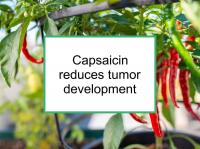Capsaicin has been reported to reduce breast cancer cell growth and increase cell death without harming normal cells. Growth inhibition and induction of apoptosis (programmed cell death) were found to be proportionate to the capsaicin content of the hot peppers in one study. In other words, the hotter the pepper, the greater the effect.
Capsaicin affects multiple signaling pathways and has been shown to alter the expression of several genes involved in cancer cell survival, growth arrest, angiogenesis and metastasis. Population studies have also found that hot pepper consumption is associated with lower risk of breast cancer. Now a new study has reported that capsaicin counteracts the effects of a mammary carcinogen in an animal model of breast cancer development.
Note that the heat of hot peppers does not protect them from infection with molds that produce aflatoxins, including aflatoxin B1, which has been shown to cause liver cancer. Buyers of hot peppers, sauces containing hot peppers, or hot pepper paste should assure themselves of their safety and quality. Non-organic peppers must be washed very thoroughly to reduce pesticide residue.
Latest research: Capsaicin counteracts effects of carcinogen
The study referenced above was designed to investigate the impact of capsaicin on tumor development in a rat model of carcinogen-induced breast cancer. To conduct the study, the authors began with 80 rats, which were assigned to several treatment groups and a control group. The study lasted 16 weeks. Rats administered the carcinogen N-nitrosomethylurea (NMU) to induce mammary tumor development were found to experience significant increases in estradiol (E2), progesterone, carcinoembryonic antigen (CEA) and malondialdehyde (a marker of oxidative stress). These rats also lost weight and experienced a decline in antioxidant enzymes.
Administering capsaicin to NMU-treated rats appeared to correct the levels of sexual hormones, antioxidants and other beneficial compounds altered by NMU. Capsaicin also improved the histopathological changes induced by NMU in the mammary tissues of the rats. In some cases, most of the layers of carcinoma cells were found to have peeled off, leaving one or two epithelial layers.
The authors conclude that capsaicin can perform an important defensive role during breast cancer development, acting as a chemosuppressive agent against NMU's carcinogenic effects.
